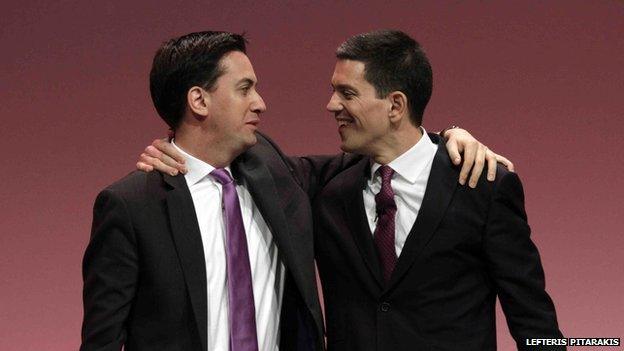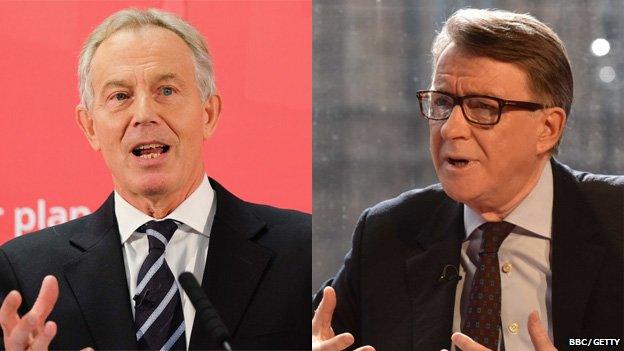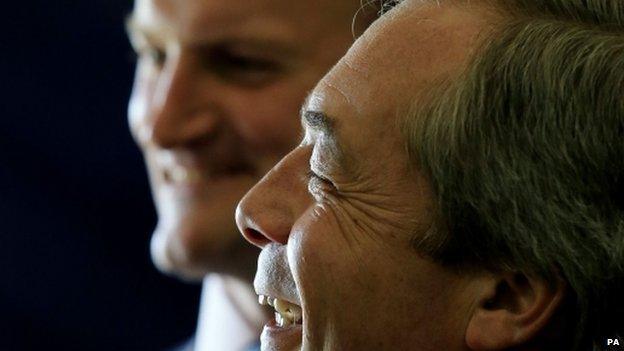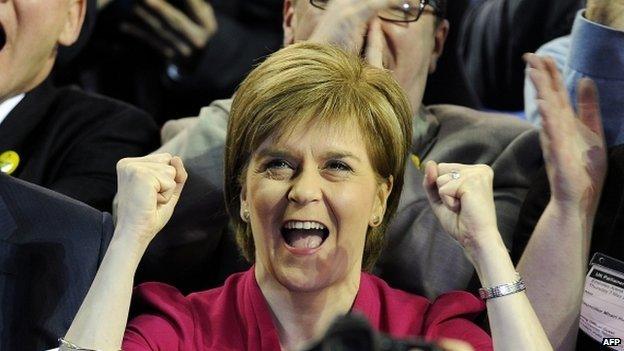Are Labour tribes readying to go to war?
- Published

David Miliband is among those who has criticised his brother's campaign
"Some of those gimmicks - that tombstone, whatever idiot thought that up I do not know!"
I was talking to the former Mayor of Crawley in Sussex, John Mortimer, in the town's Labour Supporters Club about the vexed question of what went wrong, and where Labour should go next.
This seat is one of those southern seats Labour hoped to take, but failed.
I hear a whole range of views in the club.
"They didn't give nothing to depend on, they should be clear, and a little bit more down to Earth."
"Good party, wrong leader, they don't look after business enough."
Councillor John Stanley, external tells me: "I think in a way we did go too left, but now we can go a bit centre-left, or centre, depending who the new leader is."
The former mayor sums up the mood on the doorstep: "Whatever we told them, they didn't believe us."
Old divisions
Expect to hear all those views, and more, in the coming leadership contest.
Step back from the angst of supporters, and it may not be that hard to see why Labour failed.
An economic recovery, hailed, external by independent organisations as the result of government policy, undid a party that had loudly proclaimed for five years that the coalition's policies would lead to economic disaster.

Tony Blair and Lord Mandelson have been critical of Labour's campaign
Combine that with an uncharismatic and uninspirational leader, then you might argue no further debate is necessary.
Fat chance of that.
Defeat breeds resentment, and this one has opened up old divisions.
A chorus of Blairties, led by the man himself, external, has declared that Ed's problem was ignoring those with aspiration and ambition, failing to appeal to those running business.
Incidentally, I've been ticked off by the perspicacious editor of the New Statesman, Jason Cowley, for using the "unhelpful" term "Blairites".
I can't think of another description that fits Tony, Lord Mandelson, Lord Adonis and David Miliband quite so well.
But call them what you will, the message was clear - Ed was too left wing, Labour should move back to the centre, or, if you like, to the right.
Reading Mr Blair's pithy analysis, listening to Lord Mandelson's gripping and savage eloquence, external, describing a party sent out to shout: "We love the poor and hate the rich," and so ignoring the middle, and you realise strong emotions are in play.
But back to the future may not be sufficient.
Elephants in the room

The stone pledge stunt attracted widespread derision
Of course elections are won on the centre ground.
But grandees grinding axes, affronted by the failure of boys who used to make their tea, may be creating so much noise that they can't hear more insistent sounds.
For there are several elephants trumpeting loudly as they cram into the small space of the shadow cabinet room.

Election statistics to worry Labour:
UKIP's share of the vote rose by 9.5% to 12.6%. The party came second in 120 seats
Labour came first or second in 485 seats - but the figure for the Conservatives was 511
In Scotland, the Labour share of the vote fell 17.7% to 24.3%, costing the party all but one of its 41 seats

Imagine these beasts are as gaily decorated as Berlin buddy bears, external. One is decked out in red, another in imperial purple bunting, and another, a mammoth, strong tusked and ice rimmed, painted yellow with tartan trimmings.
Take the last first.
The Scottish wipeout is Labour's biggest problem.
Fail to solve it, and Labour can forget ever having a comfortable majority again.
It is hard to argue Labour were wiped out in Scotland because the SNP outflanked them to the right with their appeal to the business community and the ambitious and aspirational.
But it is true the SNP drew in to people from left, right and centre, just as the modernisers say Labour should.
It was the politics of economic self-interest, but cast in a very different light.
Tribally sneering, external at "the reactionary ideology of nationalism" as Mr Blair does, will not reach the central belt of Scotland, the middle ground of Midlothian.
Rise of UKIP
What about that purple pachyderm? In Crawley - in fact in seat after seat - there is a similar pattern.
Labour did, in fact, often increase the size of their vote. So did the Conservatives, usually by a bit more.

The rise of UKIP has impacted on Labour
But the real dynamic was the total collapse of the Lib Dems and the dramatic rise, external of UKIP.
The increase in votes for Nigel Farage's party wasn't translated into parliamentary seats, but, although it is early days in terms of research, it probably hurt, external Labour a lot.
If we believe - and I do - Matthew Goodwin and Rob Ford, authors of Revolt on the Right, external, these voters are often former Labour supporters - older, less educated, those left behind on the tides of globalisation, stranded on the shores of post-industrialisation.
They may have had too many disappointments to feel much ambition or aspiration.
They are a challenge for Labour, and any new leader will spend a good deal of time thinking how to deal with the concerns of Europe and immigration.
Whether to share their fears, or confront them will be a big decision.
Socialist voice
Which brings us to Red Nellie. Those members who still proudly call themselves socialist.
This is not about Old Labour - they are more likely to be baristas or barristers than boilermakers.
It is easy as an outsider, as a journalist, to treat politics as an intellectual game about how best to win power - but many people, particularly the foot soldiers, particularly after the death of purely tribal loyalties, are in it because they passionately believe in winning power to do something specific.

The SNP wiped out Labour in Scotland
Many of them are suspicious of the later incarnations of New Labour, not because it reached an accommodation with wealth and business, but because it seemed to worship at the same altar, to regard the party's core beliefs in redistribution and equality as childish fantasies from a past age.
Perhaps to Mr Blair, they are the problem, people who may equate "ambition" with greed.
They might point out that a man who claims to be worth "only" £20m, external may find it harder than most to squeeze through the eye of a needle to understand their point of view.
Most successful Labour leaders will confront the left at some point, but the concerns of this group go to the existential question "What is the party for?"
This is not a polemic - not an argument about what should be done, but a reflection on the complex conundrums that will face any new Labour leader, the tearing apart of the old alliance that made up a Labour majority, and so the political need to satisfy groups with very different, indeed, contradictory demands.
But looking for a Social Democratic universal theory of everything may be missing the point.
What the party desperately wants is a leader who can pull the disparate threads together and articulate them as common purpose.
Whether she or he exists is another matter.
Much more on that in the coming months.